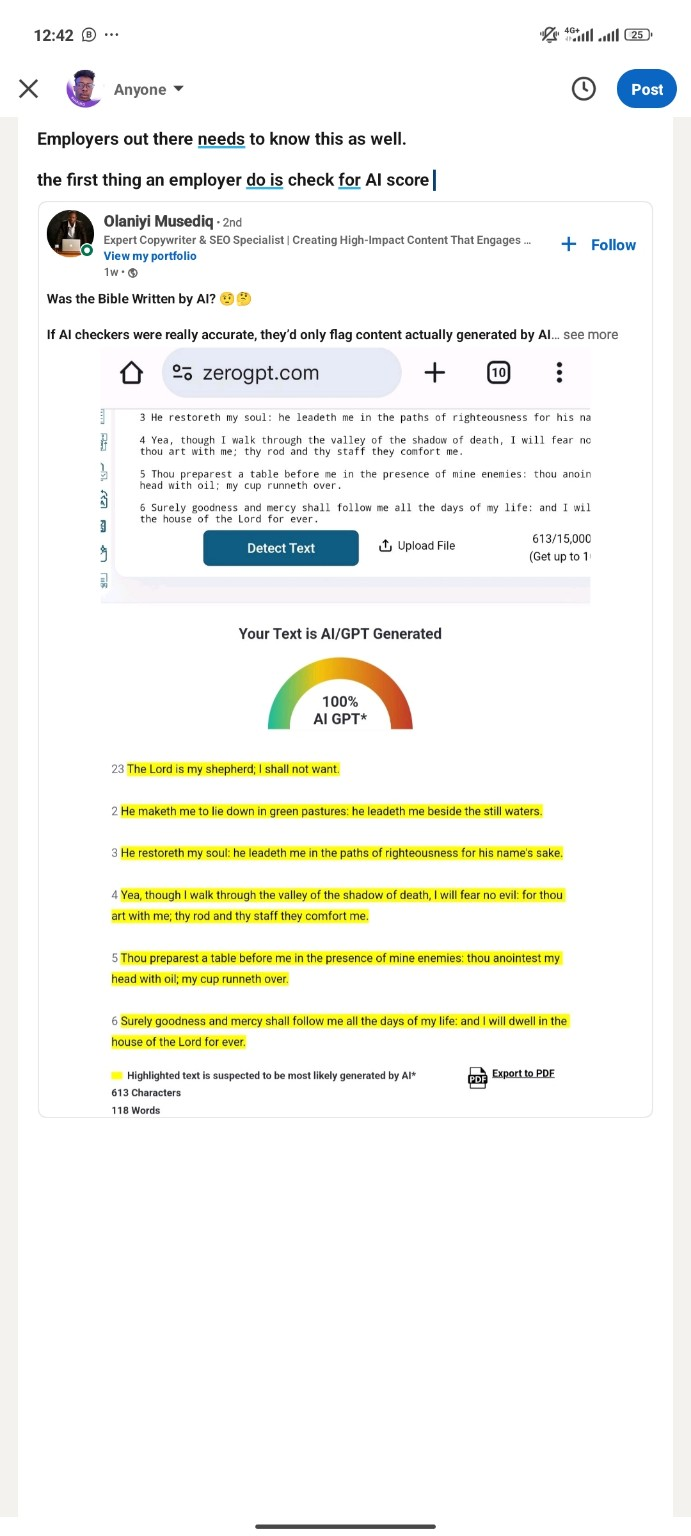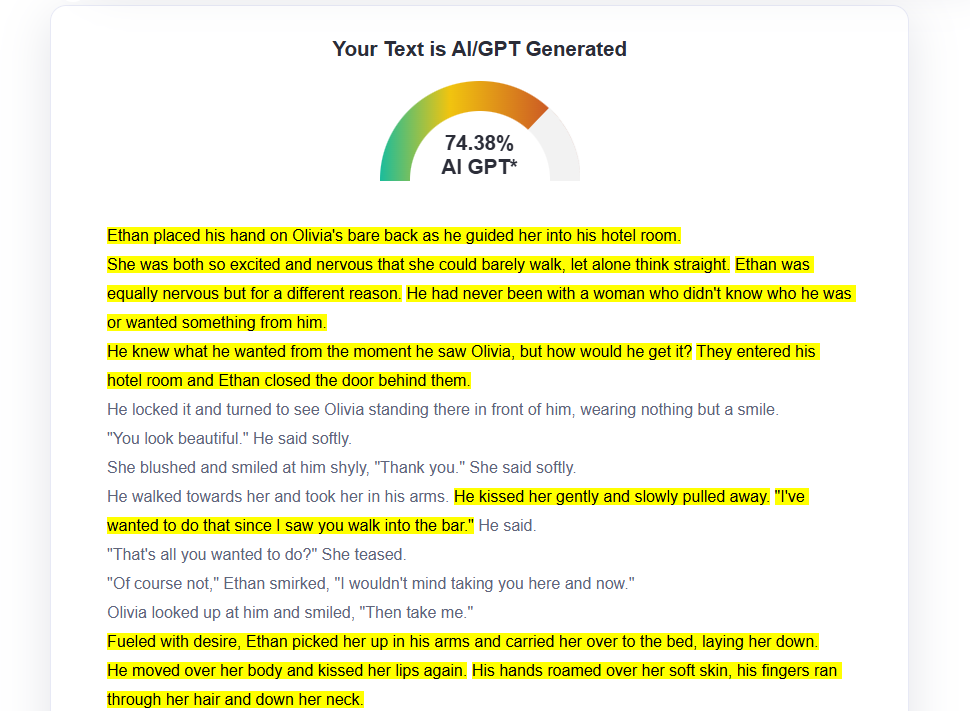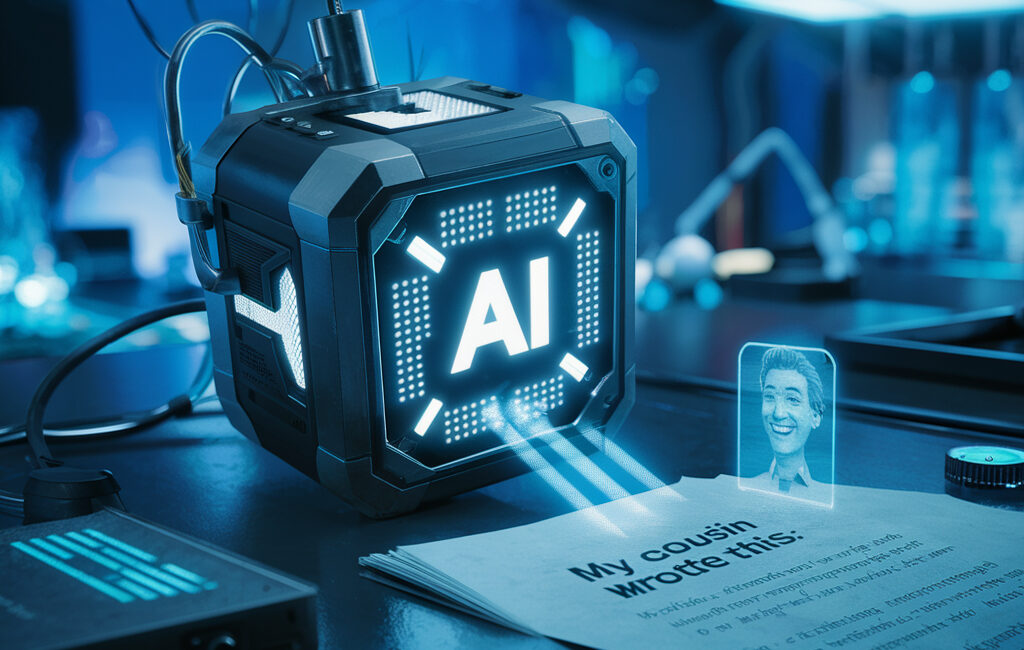Is the over-reliance on AI tools overshadowing the true value of content? Search engines rely on crawlers to evaluate and rank content. Are these bots aligned with AI detection scores, or do they focus on something more than AI scores? This article sheds light on why AI detection tools are failing writers and content creators alike.
As a writer, you deliver your content, and the first thing the employer does is open up an AI detection tool, upload the content, and is met with a bold, highlighted message that declares the content as “100% AI-generated”.
The employer sends a series of queries, and sometimes you lose that opportunity.
You’re left in awe because you know you put your time and energy into that content. Frustrating!
Misjudging authentic content can trigger unnecessary doubt and often undermine what truly makes content valuable.
Take a look at the screenshot below. The content is met with the same message, “100% AI-generated”.

The irony is that this content happens to be Psalms 23 from the Bible, an age-old script with no involvement with AI, yet it is flagged as 100% AI.
This is a blatant example of how these tools may sometimes misinterpret genuine content and another proof that AI detection tools are failing content creators.
Hence, this has sparked a certain interest among other content creators, SEO experts, and possibly even employers as well.
It raises fundamental questions like;
Is the over-reliance on AI tools overshadowing the true value of content?
Let’s dive into some answers to some burning questions on AI detection tools, crawl bots, and SEO, exploring if the fixation on AI scores misleads our content creation focus.
Question 1:
What’s the Purpose of AI Detection Tools for Employers?
Many Employers rely on AI detection tools to ensure originality and authenticity.
Because of this reason, they seem to be often focused on the score rather than the actual quality or relevance of the content.
Sometimes, it is often due to concerns about plagiarism or the impact of automated writing on brand voice.
But in the process, they undervalue content that sounds too natural or is well structured, even if it is humanly written, just because of an AI score (-scoffs-).
Question 2:
Can AI Detector Tools Be Wrong? Are They Reliable?
Well, there are so many times I’ve written things down, and it was flagged as AI content. I’m sure loads of other content creators out there have experienced the same.
But let’s consider the Bible case study above as an example.
If that is not enough, view the image below as another example.

Pardon me for the sensitive content, but I’m trying to prove a point.
The point is, and correct me if I’m wrong, but I know AIs are not programmed to render such sensitive content, so how then does smut content get flagged with a high AI score?
With this, I can say without a doubt that yes, AI detection tools are not infallible.
They flag well-structured, keyword-optimised, or even poetic human-written writing as artificial.
So what does this mean for content creators who strive to optimise their work for SEO without trying to make their content get a high AI score?
The Role of Crawl Bots
What are crawlers?
Unlike the AI detectors, crawlers work behind the scenes in search engines. They are responsible for scanning and indexing pages across the web, including blogs, to determine their relevance for search queries.
Do Crawl Bots care about AI detection Score??
Not exactly! Crawl bots are more concerned with how well content is served, the reader’s search intent and overall experience.
They’re not there to judge if the content is AI or humanly written, instead, they focus on factors like relevance, keywords, readability, structure, and backlinking quality.
In other words, it searches for content that adds value to the readers.
For bloggers, this means that crawl bots help their content discoverable and contribute to their ranking on search engines.
These bots carry out all of their functions based on the evaluation of the points above and criteria tied to SEO rather than the authorship and some arbitrary scores.
Question 3:
Why is SEO-Optimised Content Flagged as AI-Generated?
In the process of optimisation, many writers follow a structure that includes clear headers, keyword placements, and a straightforward flow.
All of these are the hallmarks of both high-quality content and human writing, but as it turns out, it is a pattern AI recognises too well.
So, AI detectors pick up SEO-friendly content as automated text.
This can be particularly frustrating for writers aiming to create clean, optimised content.
Question 4:
How Should Employers Approach Content Evaluation – Is There a Middle Ground?
Most times when an employer receives content for review, the first thing they do is check the AI score, and then maybe word count is next and a few other things before they read and assimilate the content.
A glaring proof of over-reliance on AI tools.
Employers should aim to use AI detectors as secondary checkpoints rather than primary ones.
Instead of relying first on AI, they should first review the content’s intent, readability, and engagement potential.
AI detection is just a tool and can alert you to certain patterns but should not replace genuine human judgment.
After all, AI is just a tool, and true content quality depends on the human perspective.
Conclusion:
AI detection tools and crawl bots have changed the perspective of content creation, each in its own way, considering that they play different roles.
But as we’ve seen, AI detection tools are not foolproof, and an over-reliance on AI scores may be shifting the focus from what really matters in content: authenticity, engagement, and the value of the reader.
Thus, it is time for employers to revisit their priorities, remembering that content should connect with the audience rather than appease a score.
Have you been frustrated from an employer because of this or anyone remotely ? Let’s get your exxperience with AI tools in the comment below.




